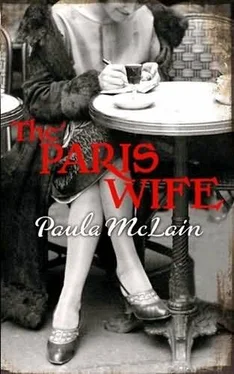I couldn’t help laughing. “Are you sure you know what you’re getting into?”
“Absolutely. And I want slippers just like yours, too. They simply have to be the same.”
“You’re a funny one. You can have these,” I said, taking off my own and handing them to her. “I’ll wear Ernest’s. That’s what marriage does to you, by the way. Somewhere along the line you discover you have your husband’s feet.”
She smiled. “I wouldn’t mind that.”
“Don’t tell me you’re getting soft on marriage. Is there someone new?”
“No, no. I’m just in love with the way you and Drum are together. There are things I didn’t see before, like how nice it is to have someone around. Not the white knight whisking you away, but the fellow who sits at your table every night and tells you what he’s thinking.”
“They don’t always do that, you know. They don’t always talk even.”
She smiled again and said she didn’t care and then put my slippers on her feet. They were standard Alpine fare, bulky and warm, lined with fleece, but she swore she loved them anyway. “I want to die in these,” she said. “You won’t be able to pry them off me.”
The conditions stayed too warm and wet for skiing, but we fell into a lovely routine anyway. Pauline was my shadow, and because I’d never had one before, I enjoyed the attention and her company. She took to watching me play the piano every afternoon, filling the space in between songs with encouragement and praise. She’d become my most important collaborator since she’d begun to push me toward the idea of a concert, and I was surprised to find I liked having her champion my cause with Ernest, who now had earmarked a portion of his advance for a rental piano when we returned to Paris. I didn’t know I’d needed her help until it was there, and I could rely on it-and then I wondered how I’d done without it.
Maybe it was the proximity, the way we three were thrown together so much, but at Schruns, Pauline began to take on a crusading role for Ernest’s work, too. She’d always admired it and thought him a great talent, but now that took a more personal turn. He’d just begun working on the Pamplona novel again, and one afternoon when Pauline and I were lunching, he came down from his studio with a clear and buoyant look in his eyes.
“Your work went well,” I said. “I’m so glad.”
“Very well. I’ve moved them on to Burguete.”
“I don’t suppose you’d let me read a little,” Pauline said.
“It’s not in any state. You’re just being polite, anyway.”
“Not at all. I just know it’s brilliant. It is, isn’t it, Hadley?”
“Of course it is,” I said. And it was. But I didn’t feel I could share, at least not yet, the breadth of my complicated feelings about the book. Even hearing her ask to read it brought a flaring of discomfort. She was a shrewd girl. What would she think when she saw I wasn’t even the smallest character? Would she believe Ernest and I were on shaky ground? Would she see something I didn’t or couldn’t?
“The Pamplona novel will wait,” he said. “It’s got more cooking to do.” He dug heartily into his plate of sausage and nice potatoes, pausing to say, “I have something else you can see if you’re really serious.”
“I’m only serious,” she said. “Didn’t you know?”
After lunch, when Ernest brought the pages down and handed them to Pauline, she said, “This is such an honor.”
“We’ll see if you feel that way when you’ve read the damned thing,” he said, and then readied himself for billiards with Herr Lent.
It was only when I walked around to read over her shoulder that I realized the manuscript he’d give her was The Torrents of Spring . I felt a small wave of nausea as I realized he’d never really stopped considering the project. He’d only been biding his time, waiting for the right reader.
After Ernest went off to his game, Pauline curled up in the nice red chair by the fire, and I went back to my piano. It was hard to concentrate because she was laughing out loud as she read. I finally decided I needed a long walk and it wasn’t until dinner, many hours later, that we all met up again.
“It’s all so hilarious,” she said to Ernest before he’d even gotten comfortable at the table. “Damned smart and very funny. You have my vote.”
“I thought it was funny, too,” he said. “But my very good friends seem to see it differently.” He looked at me pointedly.
“I just think it’s nasty to Sherwood,” I said.
Pauline could clearly see her cause now. “If the book is good, isn’t it kind of a tribute to Anderson?” she said. “No press is bad press, right?”
“That’s just what I thought,” Ernest said again, and the two kept egging each other on, growing more emphatic in their agreement.
“There’s no other way to see it, is there? Mightn’t he be flattered after all?” she said.
“No one with any stuff could be wounded by satire,” he said.
“Well, I think it’s great. It’s a damn fine book and you should submit it right away.”
It wasn’t until that moment that I fully understood how hurt he’d been when everyone, including me, had disparaged the book and shut it down. He loved and needed praise. He loved and needed to be loved, and even adored. But it worried me to have Pauline bolster him this way just now. With her encouragement, he would send Torrents to Boni and Liveright, and nothing good would likely happen then. Anderson was their most important author, and because it was his encouragement that had gotten Ernest a contract in the first place, I couldn’t imagine the book wouldn’t offend them. When Anderson heard, he’d be more than offended. My guess was we’d lose his friendship for good, the way we were clearly losing Gertrude’s. It was so hard to watch Ernest pushing these mentors away, as if striking deep blows was the only way to prove to himself (and everyone else) that he’d never really needed them in the first place. But I felt my hands were tied with this book. I couldn’t say anything else against it.
The next afternoon, Ernest arranged the typescript and put it in a bundle with a letter to Horace Liveright saying they could have the book for an advance of five hundred dollars, and that his new bullfighting novel, which he had every reason to feel excited about, was very near completed. Off the parcel went.
As we waited to hear, a fresh storm came in with more rain. We bided our time in the hotel, reading and eating better than ever. In the afternoons, Ernest and Pauline began taking long walks along the slopes behind the hotel, or winding through the town slowly, deep in conversation.
“She’s read so much,” he said to me one night when we were getting ready for bed. “And she can talk about books beautifully.”
“About more than Henry James, you mean?”
“Yes,” he said, smirking. Henry James had never stopped being our private joke, the writer that stood as the line between us, showing how stuck in the past I was no matter what else I was introduced to or had found on my own.
“She’s a smart girl all right,” I said, feeling a twinge of jealousy about their growing affinity. She was smart and seemed to find pleasure in matching Ernest intellectually. I could be a cheerleader for him and had been ever since that night in Chicago when he’d first handed me clutched and creased pages. But I wasn’t a critic. I couldn’t tell him why his work was good and why it mattered to literature, that age-old conversation among writers and lovers of books. Pauline could do that, and he was responding, as he would. He had a new energy, particularly in the evenings when he came downstairs after a day’s work, because there was someone interesting to talk to and talk with . What was more exciting than that? I could love him like crazy and work very hard to understand and support him, but I couldn’t be fresh eyes and a fresh smile after five years. I couldn’t be new.
Читать дальше












